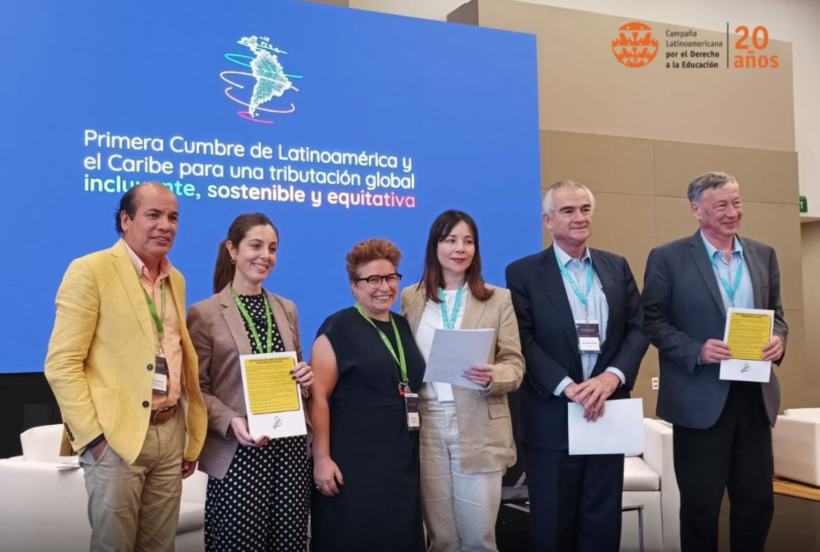During the summit of finance and treasury ministers from countries in the region, more than 50 organisations – among them the Latin American Campaign for the Right to Education (CLADE) – presented today (27th) a letter with ten recommendations to ensure a fair fiscal policy and the fulfilment of human rights, especially education.
They seek the creation of a Permanent Consultative Council of civil society to participate in the decisions and accompany the actions of regional reformulation of tax systems; the incorporation of the human rights approach and the fulfilment of the Sustainable Development Goals (SDGs) – including Goal 4, which deals with education – as a principle for the creation and reformulation of tax systems as well as the implementation of progressive tax reforms, which will prioritise taxes with real redistributive and revenue-raising potential. These are three of the eight recommendations that civil society organisations and movements, including the Latin American Campaign for the Right to Education (CLADE), presented today (27) to Latin American and Caribbean ministers in a letter.
Nelsy Lizarazo: “From our position as CLADE, promoting progressive fiscal policies with a view to ensuring sufficient funding to guarantee the right to education, in alliance with organisations throughout the region, is strategic”.
The document was delivered during the first day of the Ministerial Summit for the Latin American and Caribbean region towards an inclusive, sustainable and equitable global taxation, which takes place from 27 to 28 July in Cartagena de las Indias, Colombia, and aims to bring together leaders from the region to define the governance structure of the new tax cooperation platform and agree on the prioritisation of the most pressing issues for the regional and global discussion agenda; to find sustainable solutions that will give the international tax system the stability and flexibility desirable to face the changing global business and mobility environment.
“This first regional summit would not have been possible without the momentum and participatory processes of social organisations and academia, in dialogue with governments that have been able to listen and convene. The recommendations that we are delivering are the result of years of processes from the field of social struggles and connect fiscal policy with human rights, social and economic justice and equity. It is the no end of a first stage and the beginning of a process in which it will be necessary to sustain the momentum. From our position as CLADE, promoting progressive fiscal policies with a view to ensuring sufficient funding to guarantee the right to education, in alliance with organisations from all over the region, is strategic,” says Nelsy Lizarazo, CLADE’s General Coordinator.
Process: tax reform to guarantee rights
The letter with the recommendations presented to the ministers is the result of a process of collective construction between movements, networks and organisations preoccupied with establishing a fair tax policy system in the region to guarantee, among other rights, the human right to education.
Bogota (Colombia) and Panama City (Panama) were the two cities where meetings were held in May and June of this year, respectively, to debate and define some of the main concerns and needs of civil society in terms of fiscal policy.
According to the organisations, Latin America and the Caribbean is the region with the greatest wealth inequality on the planet, in addition to having high levels of poverty, with more than 80 million people living in extreme poverty. “Despite this, countries in the region are not using the full potential of taxation to address these problems. This scenario contradicts the human rights commitments widely assumed in the region, outside of complementary ones such as the Sustainable Development Goals (SDGs),” the organisations state in the letter delivered to the authorities.
With tax justice, the region would multiply resources for public education
One of the human rights most impacted by the lack of a fair tax system in Latin America and the Caribbean is education. According to the report Tax Justice for the Human Right to Education – A regional look from Latin America, carried out in the framework of the project “Tax Justice and the Human Right to Education: diagnosis, participation and advocacy from Latin America and the Caribbean” led by LATINDADD, the Tax Justice Network of Latin America and the Caribbean (RJFLAC) and CLADE, the region spends 3.8 times less per student, ranking fifth among the seven regions worldwide.
With fiscal justice, by recovering resources lost through abusive tax practices, increasing progressive tax collection and prioritising budget spending, it is possible to multiply the resources available for education in the region in the short term.
“It is estimated that around 5.6% of the Gross Domestic Product (GDP) of Latin America and the Caribbean is lost through both tax evasion and tax avoidance. The recovery of this money would be equivalent to the amount committed by our countries since the Incheon Declaration to advance in adequate public financing of public education systems that guarantee the right to education for all throughout life,” says Nelsy Lizarazo.






